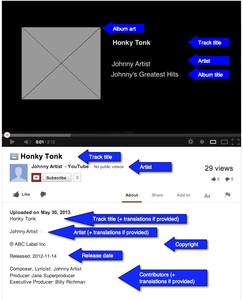- in Tips by Bobby Owsinski
What Is A YouTube Art Track?

YouTube Art Track meta data layout
You may have wondered if there was a way to just upload a song to YouTube without having to make a video, even a simple one with just a photo or cover art. It turns out there is a way to do this, and to submit to the new YouTube Music streaming service at the same time by using what YouTube calls an Art Track.
So what is an Art Track? An Art Track is an official sound recording for YouTube Music that features both high-quality audio and a static image of the album art. It consists of the sound recording, the album art, and metadata about the recording, such as its title, artist name, label and producer (see the graphic on the right).
According to YouTube, “The purpose of Art Tracks is to provide a single official, label-sanctioned YouTube version of every sound recording. Currently, official music videos are available for recordings only when a label or artist invests (non-trivial) time and resources into producing one. Art Tracks automate the creation of versions for recordings that don’t have a produced music video.
YouTube creates one Art Track for each sound recording that you upload using the YouTube Music DDEX feed or the “Audio – Art Tracks” bulk upload spreadsheet. It identifies recordings based on their ISRC, release identifier (UPC, EAN, GRid), and label. YouTube will create Art Tracks for each unique combination of these fields.
Art Tracks fill in the gaps to ensure that YouTube has a complete music catalog. They appear in the same places as produced music videos, such as on the YouTube topic channel for the main artist, in album playlists, and in search results, including watch cards for the artist. YouTube prefers the produced music video for recordings that have one.”
You can create Art Tracks for your recordings several different ways. The easy way to is use an aggregator like CD Baby, TuneCore or Distrokid, who will automatically do the submission for you. The other way is to do it yourself.
You can upload the recording and artwork media files along with a metadata file that describes the recording. The metadata is really important here, since that’s how viewers and listeners identify what the song is, but it also contains the information for getting paid. You can provide the metadata in one of two formats:
- An industry-standard DDEX Electronic Release Notification (ERN) feed
- An “Audio – Art Tracks” bulk upload spreadsheet.
YouTube then creates the Art Track based on the data that you provide in the file. You can find out more on how to make a submission here.
The Art Track consists of the artwork provided for the album and information about the track. If a track appears on multiple albums, the Art Track shows the artwork and title for the album with the earliest release date.
What’s the difference between an Art Track and a traditional music video? A lot of it determines how you’re paid.
• With a user-generated music video, the audio is immediately fingerprinted by YouTube’s Content ID. That means that if anyone uses your music on their video you’ll be notified and can then add adverts to those videos so you get paid when people watch them. As a result, you get paid on the views of your video and from others that use your song on their videos as well.
• On an Art Track you only get paid from the streams and views on that one track, very much like Spotify or Apple Music.
There’s another difference that can be important as well. On a music video the description can be long and contain links to your social media, website and Spotify playlists, but an Art Track just shows the metadata that you supply (artist name, song title, label, etc.).
Yet another difference is that the Up Next queue for an Art Track contains other Art Tracks, while for a music video it will contain other music videos.
The bottom line is that an Art Track is another way to make money from your YouTube presence but to get the song or songs up on the platform quickly. It’s intended to be an audio-only stream, which means that the audio is higher quality, but even though it can replace a music video, the best strategy is to make one anyway.


